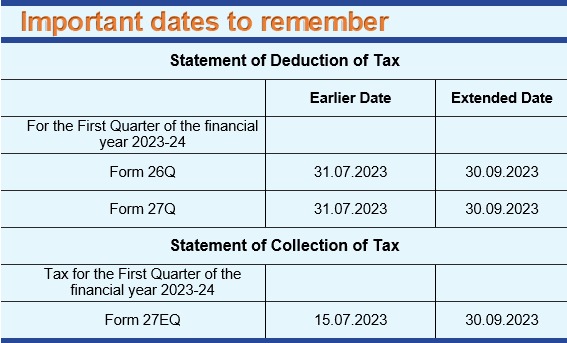SMS Concast AG vs. DDIT, International Taxation [TS-328-ITAT-2023(DEL) dated June 16, 2023]
Recently, the Tax Tribunal, Delhi Bench, inter-alia, held that supply of drawings and designs inextricably linked to sale and supply of plant and equipment cannot be taxed in India as Fees for Technical Services (‘FTS’).
On facts, the taxpayer is a company and tax resident of Switzerland engaged in the business of manufacturing and supply of plant, equipment, drawings as well as rendering of services of the nature of supervision of erection and commissioning. The taxpayer had entered into following separate contracts with an Indian company:
Supply of plant and equipment from Switzerland;
Supply of drawings and designs in relation to such plant from Switzerland, and
Supervision of erection and commissioning of the equipment as supplied.
As the taxpayer was undertaking supervisory activities, which exceeded the prescribed duration threshold, a supervisory Permanent Establishment (PE) was constituted in the hands of the taxpayer under Article 5(2)(j) of the tax treaty between India and Switzerland.
During the year under consideration, the taxpayer had received certain amount from the said Indian company for offshore supply of plant and equipment and offshore supply of drawings and designs, which were claimed as non-taxable in India. In the course of assessment, the taxpayer contended that these amounts were not taxable as the plant and equipment as well as drawings and designs were supplied from outside India, sale was completed outside India and the payments were also received outside India. However, the tax officer held that in respect of receipts from supply of plant and equipment an amount was attributable to PE in India as business profits. The tax officer further held that receipts from drawings and designs were to be characterized as FTS under the Act as well as under Article 12 of the tax treaty. While holding so, the tax officer observed that the preparation of detailed designs and drawings was in fact, rendition of technical services.
In the first appeal, the Commissioner (Appeals) held that the revenue from supply of plant and equipment was not liable to tax in India both under the provisions of the domestic law and the treaty. However, the Commissioner (Appeals) sustained the taxability of drawings and designs as FTS.
On appeal before the Tax Tribunal on the issue of taxability of designs and drawings, the Tribunal observed as under:
The designs and drawings were prepared outside India in Switzerland and the same were supplied to the Indian company from Switzerland;
Both the supply of equipment and supply of designs and drawings were in relation to a single project of the Indian company;
Although separate contracts were entered for supply of designs and drawings and supply of equipment, the same were entered on the same date;
as per clause relating to ‘right to terminate’ in the drawing and design contract, in event of failure to supply plant and equipment within the stipulated time period, Indian company had the right to terminate the contract for supply of design and drawing;
the supply of drawing and design could not be considered on standalone basis as the purchaser could not have utilized such drawings and designs without the supply of plants and equipment; and
it was not the case of the Revenue that Indian company could have got the plant and equipment manufactured from another manufacturer using drawings and designs supplied by the taxpayer.
Based on the above facts and on perusal of the details and schedule of design and drawings, the Tribunal concluded that supply of drawings and designs was inextricably linked to the supply of plant and equipment. The Tribunal relied on various decisions of High Courts including the jurisdictional High Court decision in the case of Linde AG, Linde Engineering Division vs. DDIT [2014] 365 ITR 1 (Delhi) and held that drawings and designs, being inextricably linked to the supply of plant and equipment, could not be taxed in India as FTS.
The Tribunal noted that the Revenue was not in appeal with regard to offshore supply of plant and equipment. The Tribunal held that where offshore supply of plant and equipment is treated as not taxable in India, the supply of drawings and designs inextricably linked to plant and equipment had to be considered as non-taxable in India, being part of supply of plant and equipment.
 |
Ritu Theraja Director - Tax Advisory Tel : +91 11 47102200 Email : therajaritu@mpco.in |
|---|
Ernst & Young U.S. LLP [TS-335-ITAT-2023(DEL)]
ITAT held that cost of seconded employees reimbursed by Indian entity to its overseas entity is not liable to tax as Fees for Technical Services, as the reimbursement could not be subjected to tax twice – firstly in the hands of the seconded employees working in India and secondly again in the hands of the Assessee.
On the facts of the case, Ernst & Young U.S. LLP (Assessee), provided professional services in the field of assurance, tax, advisory, etc to its global clients including EY India member firm (‘Member Firm’). During the year, Assessee received certain payments from its member firm on account of reimbursement of salaries of personnel seconded to its EY India member firm.
The Assessee filed return of Income in India which was selected for scrutiny proceedings. The Assessing officer (AO) passed the draft order proposing the payments received by the Assessee on account of Secondment cost to be taxed as Fees for technical Services (FTS) as per Article 12 of the India -USA Double Taxation Avoidance Agreement (DTAA).
Hon’ble DRP confirmed the order of AO.
Upon appeal before Hon’ble ITAT, the Assessee pointed out the terms of deputation agreement which clearly stated that member firm shall be solely responsible for the payment of salary and other personnel cost during the period of assignment and it shall have the right to undertake performance appraisal of the personnel in accordance with the policies of member firm. Thus, pursuant to such agreement, seconded personnel were employees of the Indian member firm and, accordingly, payments received are mere reimbursement of expenses incurred by the Assessee on behalf of its member firm without any profit element in it. The Assessee also submitted that salary payments to personnel have already been subject to taxation as per section 192 of the Income-tax Act as income in the hands of the seconded personnel.
The tax department placed reliance on the decision of the Hon'ble Supreme Court in the case of M/s Northern Operating Systems Pvt Ltd., Civil Appeal No. 2289 – 2293 of 2021 which was rejected by the Hon’ble ITAT by holding that the said judgment was given under the service tax regime and has to be read in the context in which it was delivered.
The Hon’ble ITAT considered the judgment in the case of Flipkart Internet Private Limited [448 ITR 268 (Karnataka High court)] wherein it has been held that the judgment of Hon’ble SC (supra) was in the context of service tax, which is not case of the Assessee in question.
The Hon’ble ITAT also considered ruling of the coordinate Bench in the case of Boeing India [P] Ltd 121 Taxmann.com 276 which had been affirmed by the Hon'ble High Court of Delhi in ITA no. 71/2022, wherein it was held that the Judgement in Centrica India Offshore Pvt. Ltd had no application, as ITAT has returned the finding that the real employer of the seconded employee continues to be the Indian entity and not the overseas entity.
Accordingly, ITAT held that the cost-to-cost reimbursement cannot be treated as FTS as defined under Article 12 of India USA-DTAA.
 |
Richa Agarwal Deputy Director - Tax Advisory Tel : +91 11 47103300 Email : richaagarwal@mpco.in |
|---|
Mahindra and Mahindra Ltd. v. CIT [TS-329-HC-2023 (Bom HC)]
Recently, the Bombay High Court has held that write-off of irrecoverable financial assistance provided to a group company is allowable as a deduction under Section 28 of the Income-tax Act, 1961.
In facts of the case, the Appellant was a promoter of its group company i.e., Machinery Manufacturer’s Corporation Limited (MMC) in which it held a 27% stake. Due to severe recession in the textile industry, MMC started making losses and was subsequently wound up. During the process of rehabilitation of MMC, the Appellant provided debt by way of financial assistance (such as waiver of outstanding dues, bank guarantees, rehabilitation assistance etc.) of Rs. 62.2 million and incurred certain other miscellaneous expenses (such as salary etc.) of Rs. 4.28 million on behalf of MMC, which were recoverable in nature. Eventually, the Appellant had claimed deduction of such financial assistance and miscellaneous expenses under Section 28 of the Income-tax Act, 1961 in its tax return filed for Assessment Year 1989-90.
The Assessing Officer disallowed the deduction claimed by the Appellant holding that such deduction does not pertain to the business of the Appellant. Both the Commissioner (Appeals) and Tax Tribunal sustained the disallowance.
On further appeal, the Bombay High Court while placing reliance on certain judicial pronouncements, observed that the Appellant had for the purpose of commercial expediency spent substantial money to revive MMC. Accordingly, the Court held that there was a business nexus between the Appellant and MMC which could not be disputed. Further, it was held that business loss, though specifically not covered under the ambit of Section 30 to Section 37 of the Act, could be claimed as deduction for computing income, Section 28 of the Act based on principle of commercial expediency.
Accordingly, the Bombay High Court held that the deduction claimed by the Appellant towards irrecoverable financial assistance and miscellaneous expenditure of MMC is admissible under Section 28 of the Act.
 |
Ankit Nanda Deputy Director - Tax Advisory Tel : +91 1147102274 Email : ankitnanda@mpco.in |
|---|
BLP Vayu (Project-1) (P.) Ltd. vs. PCIT [2023] 151 taxmann.com 47 (Delhi Tribunal)
The Tax Tribunal has held that the provisions of Section 56(2)(viib) of the Income-Tax Act (“the Act”) are not applicable on the transaction between holding company and its wholly owned subsidiary.
Section 56(2)(viib) of the Act deals with the taxability of share application money received by unlisted companies in excess of fair market value of the shares, where shares are issued at a premium.
During Financial Year 2013-14, the Assessee, a wholly owned subsidiary of an Indian company, issued shares to the latter at a premium. The share application money was, however, received in the preceding year i.e. FY 2012-13 and duly accounted for in the books of accounts of the said year by the Assessee.
During the assessment proceedings of FY 2013-14, specific queries were raised with regard to the aspect of share premium against which the Assessee claimed that the issue price of shares conforms to the fair market value (‘FMV’) of the shares. In order to validate its claim, the Assessee furnished a valuation report before the Assessing officer (‘AO’). The contention of the Assessee was accepted by the AO and order was passed without any adverse inference.
Subsequently, Principal Commissioner of Income-tax (‘PCIT’) exercised his revisionary powers under Section 263 of the Act and set aside the order passed by the AO. The PCIT alleged that the Assessing officer did not make proper inquiry into justification of share premium with regard to the FMV of the shares. Further, the AO did not examine the genuineness of the transaction and creditworthiness of the subscriber in terms of Section 68 of the Act (governing taxability of unexplained cash credits in the books of accounts).
The Assessee approached the Tax Tribunal pleading to cancel the revisional order passed by PCIT. It was submitted by the Assessee that the shares were allotted to its 100% holding company and therefore, there was no warrant to invoke the deeming fiction of Section 56(2)(viib) of the Act in the context of the case. It was also submitted that the allotment has been carried out in accordance with the FMV derived as per the Valuation Report, which was perused by the AO. Thus, the requisite inquiries were carried out by the AO.
The Tax tribunal observed that the true purport of Section 56(2)(viib) of the Act has already been analyzed by another Bench of the Tax Tribunal in the case of DCIT v. Ozone India Ltd. in ITA No.2081/Ahd/2018. As laid out in the referred decision, the objective behind the provisions of Section 56(2)(viib) is to prevent unlawful gains by the company issuing shares in the garb of capital receipts. The transaction of allotment of shares at a premium in the instant case is between holding company and its subsidiary company, and thus when seen holistically, there is no bene?t derived by the Assessee by issue of shares at certain premium, notwithstanding that the share premium exceeds a fair market value in a given case.
The Tax Tribunal held that in the instant case, not only that the fair market value is supported by independent valuer report, the allotment has been made to the existing shareholder holding 100% equity capital and therefore, there is no change in the interest or control over the money by such issuance of shares. The object of deeming an unjusti?ed premium charged on issue of share as taxable income under Section 56(2)(viib) is wholly inapplicable for transactions between holding and its subsidiary company where no income can be said to accrue to the ultimate bene?ciary, i.e., holding company. The chargeability of deemed income arising from transactions between holding and subsidiary or vice versa militates against the solemn object of Section 56(2)(viib) of the Act. The Tax Tribunal referred to the coordinate bench’s decision in the case of KBC India Pvt. Ltd. v. ITO in ITA No.9710/Del/2019, wherein a similar transaction was ruled out of the purview of Section 56(2)(viib) of the Act in the absence of benefit to any outsider.
As regards the applicability of Section 68 in this case, the Tax Tribunal noted that the share application money was accounted for in the books of the Assessee in the preceding year in which, as per the Assessee, the provisions of Section 68 could not be made applicable in the subsequent year. Furthermore, while giving effect to the order passed by PCIT (for subject year), the AO made the additions to the total income only by way of determining the fair market value of the shares, which as per the Assessee suggested that the AO was satisfied with the parameters of Section 68 of the Act.
In view of the above, the Tax Tribunal held that any revisional order by the PCIT in the context of the facts of the case appears to be wholly unjustified and does not meet the jurisdictional requirement of Section 263 of the Act. Hence, the order passed by PCIT was cancelled and the matter was decided in the favour of the Assessee.
 |
Prabhjot Singh Manager - Tax Advisory Tel : +91 11 47102200 Email : prabhjot@mpco.in |
|---|
Authority for Advance Ruling, Andhra Pradesh AAR No. 05/AP/GST/2023, dated May 26, 2023
M/S Vedmutha Electricals India Pvt Ltd is a buyer and M/S Gold Medal Electricals is a supplier of electronic items. M/S Vedmutha Electricals India Pvt Ltd has received various incentives, in the nature of “discounts” from its supplier, viz. Turnover discount, Quality discount, Cash discount, Additional scheme discount, 3-month regular scheme discount etc. year wise from effective date of registration till date. All the above discounts are in the form of after sale discount. After sale M/S Gold Medal Electricals issued commercial credit note without GST for accounting purpose only. Supplier does not reduce its output tax liability in respect to said commercial credit note.
The Advance Ruling Authority held that the amount received by the applicant/purchaser in the form of post supply discount/incentives from the supplier would not affect the transaction value between the supplier and the purchaser. Therefore, corresponding reduction in ITC is also not warranted as long as there is no corresponding reduction of outward tax liability at the end of the supplier. The applicant/purchaser would be eligible to take full ITC of GST charged on the invoice and is not required to reverse the ITC to the extent of financial / commercial credit note issued by the supplier.
 |
Shashank Goel Partner MP Law Offices Tel : +91 11 47102200 Email : shashank.goel@mplawoffices.in |
|---|
Hon’ble High Court of Calcutta has held that retrospective cancellation of registration of seller will not have any adverse impact on eligibility of input tax credit availed by the purchaser against invoices raised by the seller, while he was an active dealer as per GST records.
 |
Shashank Goel Partner MP Law Offices Tel : +91 11 47102200 Email : shashank.goel@mplawoffices.in |
|---|
The Government had notified Foreign Exchange Management (Current Account Transactions) (Amendment) Rules, 2023 vide an e-gazette notification dated May 16, 2023 to remove the differential treatment for credit cards vis à vis other modes of drawal of foreign exchange under the Liberalized Remittance Scheme (‘LRS’) and accordingly credit card payments were brought under the LRS. The Government had also issued a Press Release dated May 19, 2023 containing Frequently Asked Questions (‘FAQs’) regarding the inclusion on International Cards (‘ICCs’) under LRS.
To give adequate time to Banks and Card networks to put in place requisite IT based solutions, the Government has decided to postpone the implementation of its May 16, 2023 e-gazette notification. This would mean that transactions through International Credit Cards would not be included in LRS. The Press Release dated May 19, 2023 stands superseded.
The necessary changes to the Rules (Foreign Exchange Management (Current Account Transactions Rules), 2000) have also been issued separately on June 30, 2023
(Source: Press Release dated June 28, 2023 issued by Ministry of Finance, available at Press Information Bureau website)
_.jpg) |
Divya Ashta Senior Consultant MP Law Offices Tel : +91 1147102200 Email : divya.ashta@mplawoffices.in |
|---|
Circular No.10 of 2023 issued by CBDT dated June 30, 2023
By the Finance Act, 2023, sub-section (1G) of section 206C of the Act was amended to increase TCS on certain foreign remittances and on sale of overseas tour packages from 5% to 20% from July 01, 2023, and remove the threshold limit of INR 0.7 million for LRS payments.
The Finance Ministry had issued a notification dated May 16, 2023 to remove exemption granted to international credit card in the context of LRS. The differential treatment between other modes of payment and credit cards was done away for bringing uniformity and equity in treating the different modes of forex withdrawal. This change has presently been postponed.
To address the practical difficulties that may arise from the removal of the threshold of INR 0.7 million for LRS payments, the following decisions relating to income-tax have been taken.
The increase in TCS rates which were to come into effect from 1st July, 2023 shall now come into effect from October 01, 2023 Therefore, till September 30, 2023, the pre-amended rates (prior to the amendment by the Finance Act, 2023) shall continue to apply.
The threshold exemption of Rs. 7 lakh per financial year per individual shall be restored for TCS on all categories of LRS payments, through all modes of payment, regardless of the purpose.
For purchase of overseas tour program package under clause (ii) of sub-section (1G) of section 206C, the TCS shall continue to apply at the rate of 5% for the first Rs 7 lakh per individual per annum; the 20% rate will only apply for expenditure above this limit.
TCS rates under section 206C (1G) are summarized as under:
|
Nature of payment |
Rates applicable upto September 30, 2023 |
New rates applicable from October 01, 2023 |
|
LRS for education, financed by loan from financial institution
|
Nil upto Rs 7 lakh 0.5% above Rs 7 lakh |
Nil upto Rs 7 lakh 0.5% above Rs 7 lakh |
|
LRS for Medical treatment/ education (other than financed by loan)
|
Nil upto Rs 7 lakh 5% above Rs 7 lakh |
Nil upto Rs 7 lakh 5% above Rs 7 lakh |
|
LRS for other purposes |
Nil upto Rs 7 lakh 5% above Rs 7 lakh |
Nil upto Rs 7 lakh 20% above Rs 7 lakh |
|
Purchase of Overseas tour program package
|
5% (without threshold) |
5% upto Rs 7 lakh 20% thereafter |
As part of this circular, certain guidelines have also been issued in form of question and answers for the purpose of clarifying the doubts with respect to implementation of this section.
| Nikhil Agarwal Director - Tax Advisery Tel : +91 11 47102200 Email : nikhilagarwal@mpco.in |
|---|
